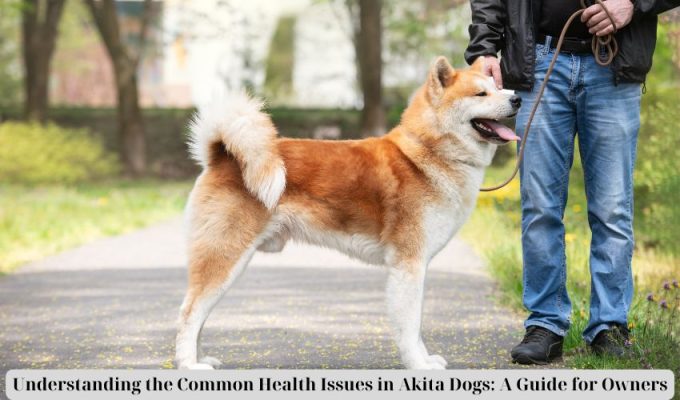Discover the prevalent health concerns affecting Akita dogs and gain valuable insights for responsible ownership.
Introduction to Akita Dogs
The Akita is a large and powerful dog breed that originated in Japan. Known for their loyalty and protective nature, Akitas are often used as guard dogs and are deeply devoted to their families. With a history deeply rooted in Japanese culture, Akitas are considered a symbol of good health, happiness, and long life.
Health Concerns
When considering bringing an Akita into your home, it’s important to be aware of the breed’s potential health concerns. Some common health issues that Akitas may be prone to include:
- Canine hip dysplasia
- Von Willebrand disease
- Progressive retinal atrophy
- Myasthenia Gravis
- Hypothyroidism
It is crucial for Akita owners to be proactive in monitoring their dog’s health and seeking appropriate veterinary care when needed. Additionally, understanding the potential health risks can help in making informed decisions about breeding and genetic testing for Akitas.
Overall, Akitas are loving and loyal companions, but it’s essential to be mindful of their health needs to ensure they live long, happy, and healthy lives.
Genetic Health Problems
Genetic health problems in Akitas can be a cause for concern for potential owners. These dogs are predisposed to certain genetic conditions that can impact their quality of life. It’s important for prospective owners to be aware of these issues and take necessary precautions to ensure the well-being of their Akita.
Common Genetic Health Problems in Akitas
– Canine hip dysplasia
– Von Willebrand disease
– Progressive retinal atrophy (PRA)
– Myasthenia Gravis
– Hypothyroidism
Each of these genetic health problems can have a significant impact on an Akita’s health and longevity. It’s crucial for owners to be proactive in monitoring their dog’s health and seeking appropriate veterinary care when necessary.
It’s important to note that responsible breeding practices and genetic testing can help mitigate the risk of these genetic health problems in Akitas. When acquiring an Akita from a breeder, it’s advisable to inquire about the health history of the dog’s lineage and any genetic testing that has been conducted.

Orthopedic Conditions
Orthopedic conditions in dogs, including Akitas, can be a source of significant discomfort and reduced mobility. One common orthopedic condition is osteoarthritis, which is characterized by the degeneration of joint cartilage and the underlying bone. This can lead to pain, stiffness, and difficulty moving. Another common orthopedic condition is cruciate ligament injury, which can cause lameness and instability in the affected limb. Additionally, Akitas may be prone to elbow dysplasia, a developmental condition that can lead to joint pain and lameness.
Common Orthopedic Conditions in Akitas:
- Osteoarthritis
- Cruciate ligament injury
- Elbow dysplasia
It is important for Akita owners to be aware of these orthopedic conditions and to work with their veterinarian to develop a treatment plan that may include medication, physical therapy, and in some cases, surgical intervention. Additionally, maintaining a healthy weight and providing appropriate exercise can help manage and prevent orthopedic issues in Akitas.
Dermatological Concerns
Skin issues are a common concern for Akitas, and it’s important for owners to be aware of potential dermatological problems that may arise. Akitas are prone to allergies, which can manifest in skin irritation, itching, and hair loss. Additionally, they may be susceptible to conditions such as atopic dermatitis and hot spots. Proper grooming, regular baths, and a balanced diet can help manage these dermatological concerns. It’s important to consult with a veterinarian if you notice any skin issues in your Akita.
Common Dermatological Concerns for Akitas:
– Allergies: Akitas are prone to allergies, which can cause skin irritation, itching, and hair loss.
– Atopic Dermatitis: This chronic skin condition can cause red, itchy, and inflamed skin in Akitas.
– Hot Spots: Akitas may develop hot spots, which are areas of inflamed and infected skin that can be very uncomfortable for the dog.
Overall, being attentive to your Akita’s skin health and seeking veterinary care when necessary can help manage and prevent dermatological concerns.
Behavioral Health Issues
Separation Anxiety
One common behavioral health issue in dogs, including Akitas, is separation anxiety. This condition occurs when a dog becomes distressed when separated from their owner or left alone. Symptoms can include excessive barking, destructive behavior, and even attempts to escape. It’s important for pet owners to address separation anxiety through training, desensitization, and possibly even medication under the guidance of a veterinarian or animal behaviorist.
Aggression
Aggression can also be a concern with Akitas, as they are known for their protective nature. However, if not properly managed, aggression can become a behavioral issue. This can manifest as aggression towards other animals or even people. Training and socialization from an early age are important for preventing and managing aggression in Akitas. It’s crucial for pet owners to seek professional help if their dog displays aggressive behavior.
Fear and Phobias
Akitas, like many other breeds, can develop fears and phobias that impact their behavior. Common triggers for fear and phobias in dogs include loud noises, unfamiliar people or animals, and certain environments. It’s important for pet owners to provide a safe and secure environment for their Akita and to work with a professional to help their dog overcome these fears. This may involve behavior modification techniques and desensitization training.
Addressing behavioral health issues in Akitas requires patience, consistency, and often professional guidance. Pet owners should prioritize their dog’s mental well-being and seek help from qualified professionals when needed to ensure a happy and healthy relationship with their furry companion.
Nutritional Needs
Akitas are a large and powerful breed, so it’s important to ensure that they receive a balanced and nutritious diet to support their overall health and well-being. Their nutritional needs may vary depending on their age, size, and activity level. It’s essential to consult with a veterinarian or a professional animal nutritionist to determine the best diet for your Akita.
Key Nutritional Requirements
– Protein: Akitas require a diet that is rich in high-quality animal-based protein to support their muscle mass and overall growth.
– Fats: Healthy fats are important for providing energy and supporting the health of the skin and coat.
– Carbohydrates: A moderate amount of carbohydrates can provide a source of energy for Akitas, but it’s important to choose complex carbohydrates to avoid spikes in blood sugar levels.
– Vitamins and Minerals: A well-balanced diet should include essential vitamins and minerals to support the overall health and immune function of Akitas.
It’s important to choose a high-quality commercial dog food that is specifically formulated for large and active breeds. Additionally, incorporating fresh, whole foods such as lean meats, fruits, and vegetables can also provide additional nutrients for your Akita. Always ensure that your dog has access to fresh, clean water at all times to support proper hydration.
Overall Health and Wellness
When it comes to the overall health and wellness of your beloved pets, it’s important to stay informed about common health concerns and potential treatments. Regular veterinary check-ups, a balanced diet, regular exercise, and mental stimulation are all key components of maintaining your pet’s overall health and wellness. Additionally, staying up to date on the latest advancements in veterinary medicine, such as stem cell therapy, can provide valuable insight into potential treatment options for various health conditions.
Common Health Concerns
1. Canine hip dysplasia
2. Von Willebrand disease
3. Progressive retinal atrophy (PRA)
4. Myasthenia Gravis
5. Hypothyroidism
It’s important to be aware of these common health concerns and their potential impact on your pet’s well-being. By staying informed and proactive, you can work with your veterinarian to develop a comprehensive health plan for your pet.
In addition to addressing specific health concerns, it’s also important to consider the overall well-being of your pet. This includes providing a safe and enriching environment, regular grooming, and dental care. Mental stimulation and socialization are also crucial for your pet’s overall wellness, as they contribute to mental and emotional health.
By prioritizing the overall health and wellness of your pet, you can ensure that they live a happy, healthy, and fulfilling life. Remember to consult with your veterinarian for personalized guidance and recommendations based on your pet’s individual needs.
In conclusion, Akita dogs are prone to certain health issues such as hip dysplasia, autoimmune diseases, and eye problems. It is important for owners to be aware of these potential issues and to provide proper care and regular vet check-ups to ensure the health and well-being of their beloved pets.




